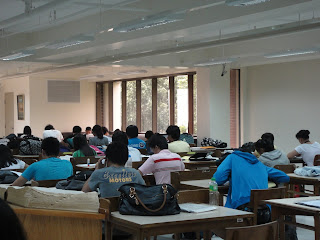*Observers wanted to get a feel of how students handled their workload in various areas of the Ateneo campus at different times.
Places observed: The Rizal Library (General Reference, Foreign Serials, Multimedia, General Circulation 3rd flr & 4th, Information Commons 3rd & 4th flr) Cafeteria (up & down), Secwalk benches, MVP basement, Matteo Ricci (steps, individual study areas, balcony, group study areas), CTC Computer Lab, and JSEC
Observations:
1. There are less people in campus before lunch. You can choose where you want to stay. More people sleep in the morning, more people study during/ a little after lunch.
 |
| Foreign Serials Section in the morning |
 |
| Foreign Serials in the afternoon |
 |
| General Circulation in the morning |
 |
| General Circulation in the afternoon |
 |
| Rizal Library entrance during lunch time |
 |
Matteo Ricci in the morning
|
Odd random observation: seats by the windows (in the Rizal Lib and Matteo Ricci) get filled up first--kind of reminded me of choosing seats on airplanes
 |
| Seats near windows are full while there are lots of space everywhere else. |
2 2. More people sleep and space out in the couches than those using desks.
3. Those who use the computers in the Rizal Library (1st floor, 3rd floor, and 4th floor information commons) and CTC lab are mostly either
a. Working on a paper
b. Constantly check their facebook profiles or some other non-academic related website from time to time thus leaving their schoolwork left unfinished or prolonged
 |
Facebook!
|
4. Those who have their own laptops tend to multitask more. They alternate between surfing, writing a paper, highlighting readings, etc) more than the students who use the school’s computers. Some students have their chatboxes open (Yahoo Messenger, for instance) and chat with friends while doing their schoolwork (whether this is academically related or not wasn't actually observed).
 |
| Mixing work with play |
5. People who read their books in the library tend to isolate themselves from other people (they look for a seat by the window or away from large crowds).
6. Even those who are deeply focused on their work without a laptop to distract them take a break at some point. They check their phones, look around, etc. These students start looking around the library for some reason (I suppose this is when their minds start to wander and lose their focus). Some students, after studying for quite some time, fall asleep (probably due to strain in the eyes or lack of sleep?).
 |
Focused student takes a break by checking phone and looking around.
|
7. Some people just space out in the lib/ matteo ricci. They don’t have anything on their desks except their bags, they’re not sleeping but they don’t look too awake either.
8. People studying in groups do not talk to each other. They are huddled in a circle, but they are each absorbed in their own world. They only talk to each other to consult/ ask questions occasionally. Most of these groups are on math/ science.
9. Noisy groups who look like they are studying (armed with notes, books, calculators, highlighters) spend more time complaining about the subject they are studying for rather than actually studying.
 |
Eavesdropped on both groups and they seem to be complaining a lot more than studying.
|
10. Instead of feeling like an extension of the library in that it’s supposed to be a quiet place, group study areas in Matteo Ricci felt like an extension of the cafeteria. More people are gossiping and playing cards than those studying.
 |
| Only one group study was happening in Matteo Ricci (during observation). |
11. People sleep, study, and eat anywhere. Despite library rules, some students bring food to the library while studying. There are more people studying or lounging than eating in the caf and JSEC if it’s not lunch time. Secwalk benches (most who stay here are about to have classes near the area), Matteo steps, and MVP basement are also sleep-study-eat hotspots.
 |
| Sleeping at MVP basement |
 |
| Studying at MVP basement |
 |
| Studying at Secwalk benches |
 |
| Sleeping at the caf |
 |
| Sleeping at the lib |
 |
| Studying at the caf |
 |
| Studying at the caf |
 |
Studying at Matteo steps
|
12. Those who are really focused on what they are doing seem to be absorbed in their own world, regardless of location and time.
13. There are students who are easily distracted and cant seem to focus on their work.
14. Studying styles are also unique to each individual. Some listen to music, some have extremely organized desks, some have paper everywhere, some tend to have more rigid shoulders, and others sit more comfortably.
 |
| Desk organization sample #1 |
 |
| Desk organization sample #2 |
 |
| Different postures, all working |
 |
| Super organized papers |
 |
| Relaxed posture while studying |
 |
| Desk organization sample #3 |
 |
| Studying with music |
 |
| Study posture sample |
 |
| Study posture sample #2 |
 |
Different study postures
|
*Kate Tan and Carlos Zotomayor




































